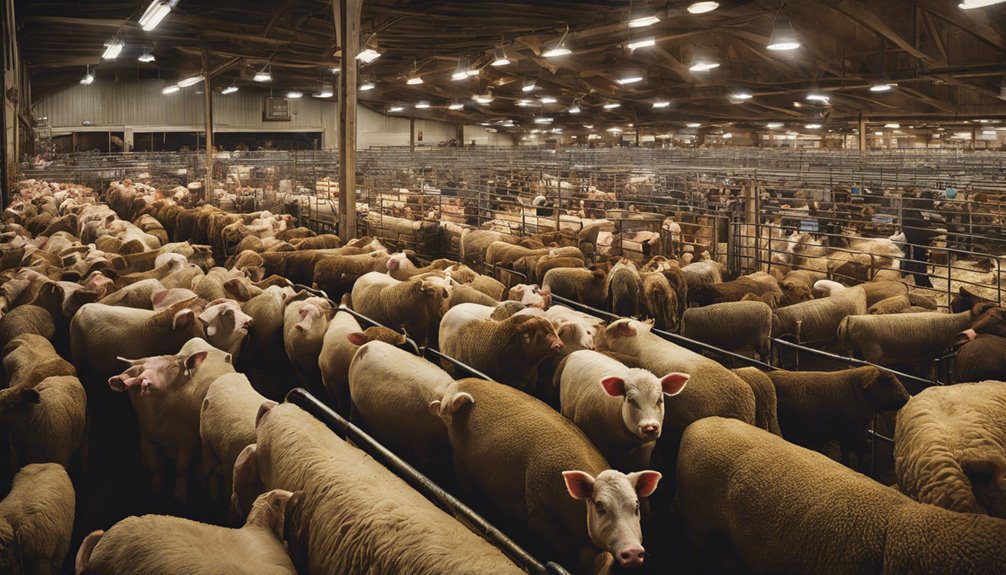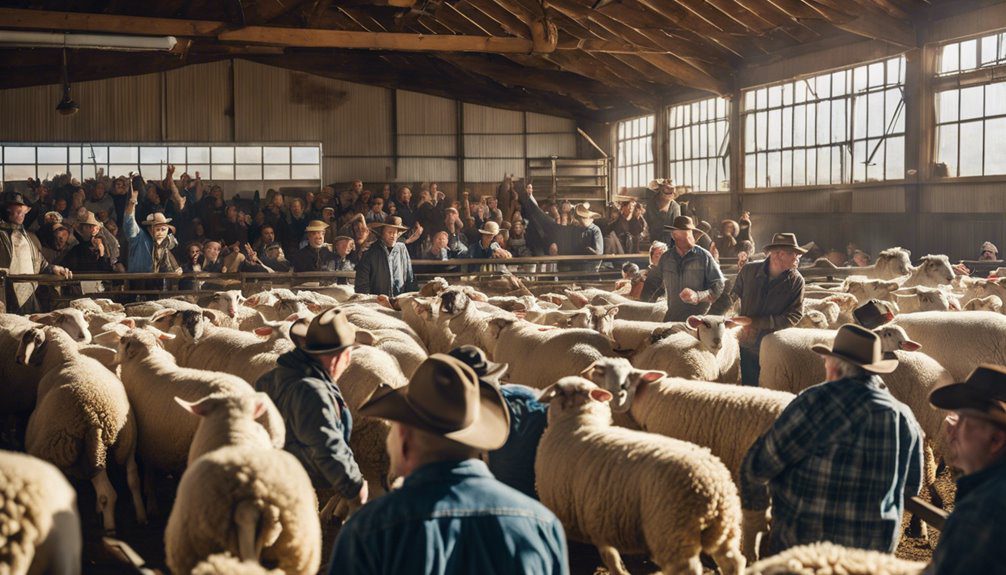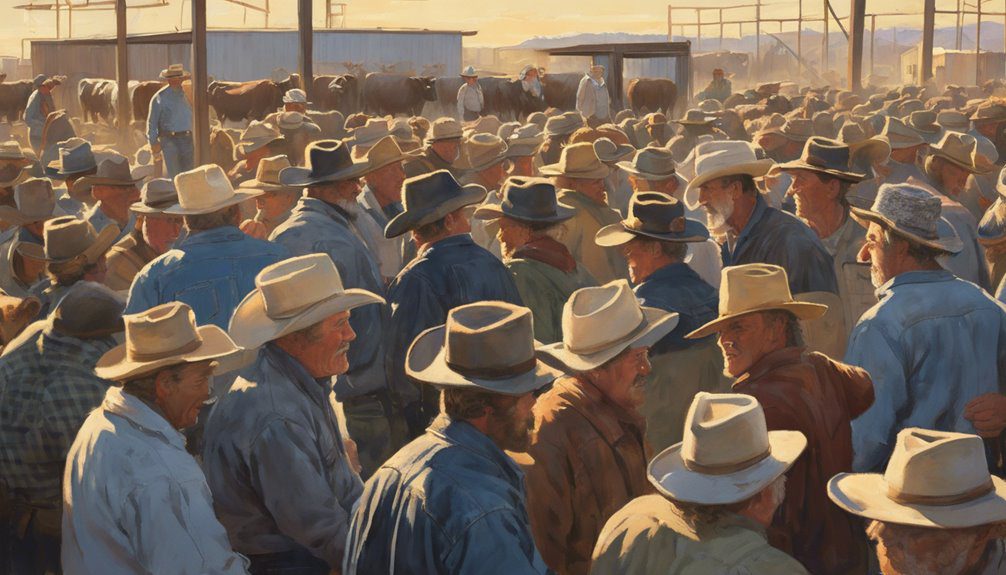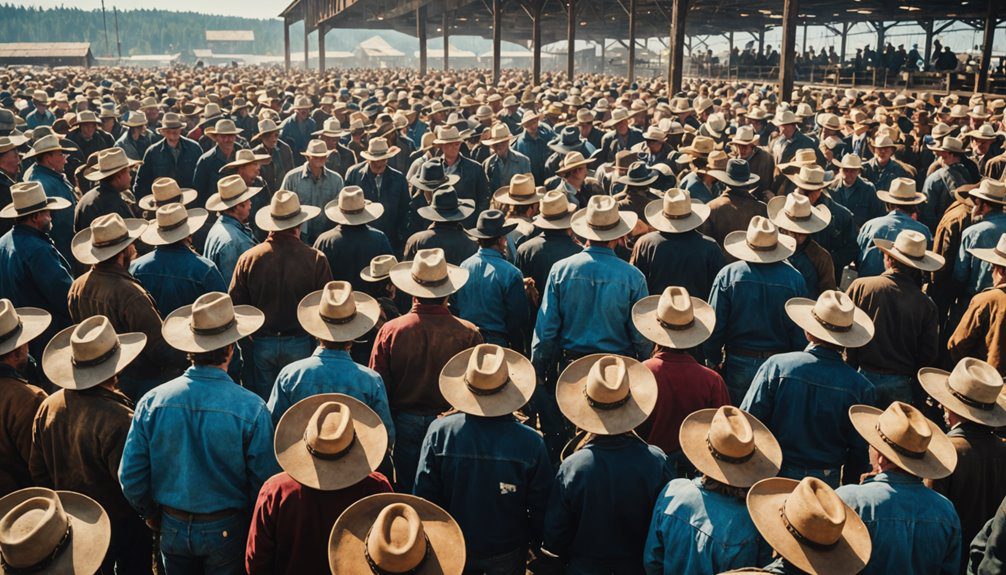You might not realize just how vital the livestock auction market bond is in Oregon's agricultural landscape. This bond not only safeguards transactions but also reinforces the trust that buyers and sellers place in each other. As you consider the implications of this bond, it's worth exploring how it adapts to the evolving marketplace, especially with online auctions gaining traction. What challenges and transformations could lie ahead for farmers and ranchers in this shifting environment?
Overview of Livestock Auction Bonds

Livestock auction bonds play a crucial role in ensuring the integrity and reliability of the auction process. These bonds act as a form of financial security, protecting both buyers and sellers involved in livestock transactions. When you participate in an auction, these bonds provide a safety net, ensuring that everyone adheres to the rules and regulations governing the sale.
You might be wondering how these bonds work. Essentially, when an auction house applies for a bond, it must demonstrate its financial responsibility and ability to operate ethically. If an auction fails to fulfill its obligations or if fraud occurs, the bond can be used to compensate affected parties. This means you can bid with more confidence, knowing there's a layer of protection in place.
Moreover, livestock auction bonds are often required by state regulations, ensuring that auctioneers maintain a high standard of conduct. By ensuring that auction houses are bonded, you help support a marketplace that values trust and accountability.
Whether you're selling or buying, understanding this bond's purpose can enhance your overall experience in the livestock auction market.
Importance of the Bond
The importance of the bond in the livestock auction market can't be overstated. It acts as a safety net for all parties involved, ensuring that buyers and sellers alike are protected during transactions. When you participate in livestock auctions, you want peace of mind knowing that your financial interests are safeguarded. The bond serves to guarantee that sellers will receive payment for their livestock, preventing potential losses from unscrupulous practices.
Moreover, having a bond increases credibility and trust among auction participants. When you see that a livestock auction market is bonded, it signals that they adhere to regulations and standards, which enhances their reputation. This assurance encourages more buyers and sellers to engage, boosting overall market activity.
Additionally, bonds help maintain industry integrity. They minimize the risk of fraud, as auction markets are held accountable for their operations. If a market fails to honor its commitments, the bond can provide compensation to affected parties, thus maintaining consumer confidence. Furthermore, the bond functions similarly to debt consolidator bonds, which protect consumers by ensuring compliance with laws and regulations.
In essence, the bond is crucial for fostering a stable and trustworthy environment in the livestock auction market. It protects your interests while promoting a healthier marketplace for everyone involved.
Requirements for Obtaining a Bond

Obtaining a bond for participation in the livestock auction market involves meeting specific requirements that ensure both compliance and financial responsibility.
First, you'll need to provide proof of your business license and any necessary permits for operating in the livestock sector. This establishes your legitimacy and adherence to local regulations.
Next, you'll typically need to demonstrate your financial stability. This often includes providing financial statements or proof of assets that show you can cover the bond amount. Lenders or bonding companies want to see that you're capable of fulfilling your financial obligations.
Additionally, expect to submit an application detailing your business operations and history in the livestock market. This helps bonding companies assess your risk level and determine your eligibility for coverage.
How the Bond Works
When you secure an Oregon livestock auction market bond, it acts as a financial guarantee that protects buyers and sellers involved in the auction process. This bond ensures that the auction market operates fairly and ethically, providing reassurance that all transactions will be honored. If a seller fails to deliver livestock, or if a buyer doesn't pay for their purchase, the bond can cover the financial loss.
The bond typically requires you to pay a premium, which is a percentage of the total bond amount. This premium is influenced by factors like your credit score and the bond amount you choose. Once you've obtained the bond, it remains in effect for a specific duration, usually until you renew it or the auction market ceases operations.
In case of a dispute, affected parties can file a claim against the bond. If the claim is validated, the surety company will pay the claim amount, up to the bond limit. However, you'll need to reimburse the surety for any claims paid out.
This system helps maintain trust and accountability in the livestock auction market, benefitting everyone involved.
Types of Livestock Auction Markets

Various types of livestock auction markets exist, each catering to different needs within the agricultural community. When you're looking to buy or sell livestock, it's crucial to understand the options available to you.
One common type is the traditional livestock auction, where buyers and sellers gather at a physical location. Here, you can witness live bidding, which fosters competition and often leads to better prices.
Then, there are online livestock auctions, which have gained popularity for their convenience. You can participate from anywhere, allowing you to reach a wider audience of potential buyers or sellers.
Another option is private treaty sales, where you negotiate directly with the buyer or seller without going through a formal auction process. This method can be advantageous if you have specific price expectations or wish to maintain privacy.
Additionally, some markets specialize in particular livestock types, like cattle, sheep, or hogs, offering tailored services to meet the specific needs of those animals.
Common Challenges Faced
Navigating the livestock auction market isn't without its hurdles. You might encounter fluctuations in market prices that can make it difficult to determine the right time to sell your livestock. These price changes can be influenced by various factors, such as seasonal demand, feed costs, and even economic conditions. Staying informed about these trends is crucial, but it can be overwhelming.
Another challenge you might face is the competition among sellers. With many producers vying for buyers' attention, it can be tough to make your livestock stand out. You'll need to invest time in marketing your animals effectively, which often involves understanding buyer preferences and showcasing your livestock's quality.
Additionally, you may deal with regulatory requirements, which can vary significantly from one auction to another. Meeting these regulations can be time-consuming and may require additional paperwork or inspections.
Lastly, there's the risk of unsold livestock. If your animals don't attract bids, you may have to wait for another auction or consider alternative selling methods, which can affect your overall profitability.
Being prepared for these challenges can help you navigate the livestock auction market more successfully.
Impact on Farmers and Ranchers

The livestock auction market significantly impacts farmers and ranchers, shaping their financial stability and operational decisions. When you decide to sell your livestock, the auction market serves as a crucial platform for determining prices based on current demand and supply conditions. This market dynamic can either bolster your income or pose significant financial risks.
You rely on auction outcomes to plan your operational strategies. For instance, if prices are favorable, you might consider expanding your herd or investing in better feed and facilities. Conversely, a downturn in auction prices could force you to reconsider your budget, possibly delaying necessary upgrades or even leading to difficult decisions about herd size.
Moreover, the auction market influences your cash flow cycles. Since livestock sales are often seasonal, understanding market trends helps you optimize your sales timing. Additionally, engaging with local auction houses fosters relationships that can lead to better sales opportunities and insights into market conditions.
Ultimately, the auction market plays a vital role in your farming or ranching enterprise, affecting not only your immediate financial health but also your long-term growth potential and sustainability.
Future Trends in the Market
As auction outcomes shape your financial strategies, staying ahead of future trends in the livestock market becomes increasingly vital.
You'll want to keep a close eye on technological advancements impacting livestock auctions. Innovations like online bidding platforms are gaining traction, making auctions more accessible and competitive. This shift could influence pricing and buyer behavior, so adapting quickly will be key.
Sustainability is another trend you can't afford to ignore. Consumers are increasingly demanding ethically raised and environmentally sustainable livestock. If you focus on these practices, you'll likely attract a premium price at auction.
Moreover, the rise in demand for local products is reshaping market dynamics. You should consider building relationships with local buyers who value transparency and quality.
Lastly, global trade policies and economic shifts can greatly affect the livestock market. Staying informed about these changes will help you make strategic decisions.
Conclusion
In conclusion, the livestock auction market bond is vital for ensuring trust and security in Oregon's livestock transactions. By protecting both buyers and sellers, this bond fosters a reliable marketplace that benefits farmers and ranchers alike. As the market continues to evolve, especially with online platforms gaining traction, the importance of maintaining these bonds can't be overstated. Embracing these changes will help you navigate the future of livestock auctions with confidence and peace of mind.


